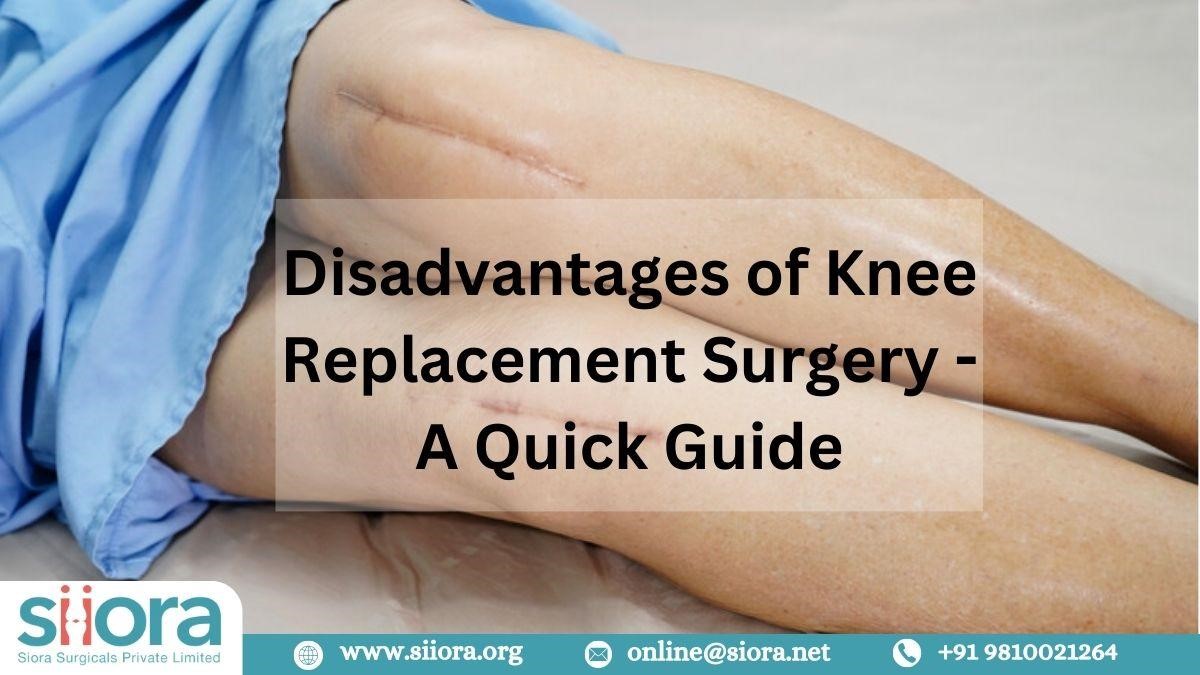Knee replacement surgery, medically known as knee arthroplasty, has become a common procedure for individuals suffering from severe knee joint pain and reduced mobility due to conditions like osteoarthritis, rheumatoid arthritis, or injury. Knee Arthroscopy Implants are used during the surgery to replace the damaged knee joint. While this surgery can be life-changing and offer significant benefits, it is essential to be aware of the potential disadvantages and risks associated with it. In this blog, we will delve into some of the disadvantages of knee replacement surgery to help you make an informed decision if you or a loved one are considering this procedure.
What Are the Disadvantages of Knee Replacement Surgery?
Surgical Risks
Like any surgical procedure, knee replacement surgery carries inherent surgical risks. These risks may include infection, blood clots, anesthesia complications, and bleeding. Although these complications are relatively rare, they are serious and can have long-term consequences if not promptly addressed. Infections, for instance, can lead to the need for further surgery and prolonged antibiotic treatment, while blood clots can be life-threatening if they travel to the lungs or brain.
Limited Lifespan of Implants
Knee replacement implants are not designed to last a lifetime. Most implants have a lifespan of around 15 to 20 years, and their longevity can be influenced by factors such as the patient’s age, activity level, and the type of implant used. When an implant wears out or becomes loose, revision surgery is necessary. Revision surgery is often more complex and may have a higher risk of complications compared to the initial knee replacement.
Post-Surgery Pain
While knee replacement surgery is intended to alleviate chronic knee pain, patients often experience significant pain and discomfort in the initial weeks and months following the procedure. It can take time for the surgical site to heal, and the recovery process can be challenging. Pain management, physical therapy, and rehabilitation are crucial components of the recovery process, but some patients find this period to be quite demanding.
Limited Range of Motion
Although knee replacement surgery can improve joint function and reduce pain, some patients may not achieve the same range of motion they had before the surgery. Stiffness and reduced flexibility can persist in some cases, particularly if the patient does not diligently follow their post-operative rehabilitation program. Achieving a full range of motion may take time and dedication to physical therapy.
Scarring
Knee replacement surgery leaves a scar, which can vary in size depending on the surgical approach used. While scarring is a natural outcome of surgery, some individuals may be concerned about the cosmetic appearance of the scar, particularly if it is large or raised. Although there are treatments available to improve the appearance of scars, complete removal is typically not possible.
Allergic Reactions
In rare cases, patients may experience allergic reactions to materials used in the knee replacement implants, such as metals (like nickel and cobalt) or cement used to secure the implant. These allergic reactions can cause pain, inflammation, and swelling in the joint, leading to the need for revision surgery to replace the implant with a hypoallergenic one.
Complications for Certain Groups
Knee replacement surgery may be riskier for certain groups of individuals, including those who are obese, have poorly controlled diabetes, or have underlying medical conditions. These factors can increase the likelihood of complications during and after surgery. Therefore, it is crucial for patients to discuss their individual risk factors with their healthcare provider and carefully consider the potential disadvantages.
Post-Surgery Rehabilitation
The success of knee replacement surgery largely depends on the patient’s commitment to post-surgery rehabilitation. This can be a disadvantage for those who are unable or unwilling to dedicate the necessary time and effort to physical therapy and exercises. Without proper rehabilitation, the patient may not achieve optimal results, and the recovery process can be prolonged.
Get acquainted with the latest advancements in the orthopedic industry and interact with global orthopedic leaders at the 68th Annual Conference in Lucknow. Siora Surgicals Pvt. Ltd., a trustworthy orthopedic device manufacturer, will also be waiting for you at the event at stalls 51 & 52.


